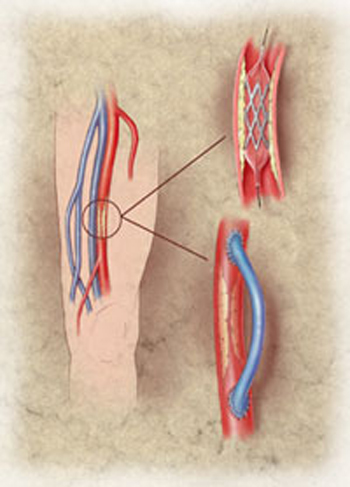For elderly patients with complicated vascular conditions associated with multiple vascular lesions, conventional treatments such as surgery or vascular intervention are often not an option. Multi-location surgeries performed simultaneously would have a serious negative effect on the patient’s health. Multi-vascular concurrent interventions are also not always feasible. The current global trend in the world is to combine surgery and intervention, known as the Hybrid Methodology, to minimise adverse impacts on patient health. FV Hospital’s Vascular Surgery Department recently saved the life of an elderly European patient with complicated vascular condition by utilising the Hybrid Methodology.
German patient Mr. N., 69, was admitted to FV Hospital where investigation imaging showed a blockage of his right iliac artery, left iliac artery stenosis, blockages in the bilateral femoral arteries, artery stenosis below the knee and aortic valve stenosis.
In cases of elderly patients with these kind o complicated, highly progressed vascular conditions, it’s prudent to consider surgical and interventional procedures. Following thorough examination and investigation tests, Dr Luong Ngoc Trung, FVH Vascular Surgery, decided to utilise Hybrid Methodology, i.e. stenting combined with endovenous intervention, to treat Mr N.
Firstly, Dr Trung conducted an iliac artery angioplasty and stenting to solve the aortic blockage and narrowing. Hybrid methodology enables surgeons to treat multiple injuries at the same time and, in this case, to approach Mr N.’s vascular problems in the left and right iliac arteries, artery below the knee and the aorta.
To handle the patient’s blocked bilateral femoral arteries, Dr Trung developed a femoral artery bypass through open surgery.
This procedure began with two incisions where the femoral arteries begin and the creation of autogenous vein bypasses. Then the great saphenous vein in situ was grafted, which involved exposing the beginning and the end of the vein, preparation for occlusion of one end followed by valvulotomy by a specialised instrument and then occlusion of the other end of vein. This is an advanced technique that helps the patient to avoid a long incision and therefore scarring along their leg, minimising the risk of infection and enabling the patient to walk sooner.

Hybrid methodology takes the best of surgical treatment and endovenous intervention. Surgery allows closer exposure to vascular lesions and better access to and handling of blood vessels which are difficult to treat using endovenous intervention. The advanced techniques possible via endovenous intervention allow effective treatment for large veins in challenging and distant locations.
This combination helps vascular surgeons to effectively handle challenging and complicated lesions that in some cases could not be managed by surgery or conventional intervention methods alone. Research shows that Hybrid Methodology results in faster blood circulation recovery, is less risky than surgery and results in a shorter hospital stay. The large advantage of endovenous intervention is to avoid possible complications associated with open chest surgery, lengthy anaesthesia and extracorporeal membrane oxygenation (ECMO), among other risks.
Hybrid Methodology is a relatively new technique, only introduced in Vietnam in 2011. With its proven outstanding strengths and outcomes, the combination of surgery and endovenous intervention provides even more satisfactory results when performed in a healthcare environment equipped with modern facilities, a highly qualified clinical team and professional postoperative care, such as FV Hospital.

 Vi
Vi 












